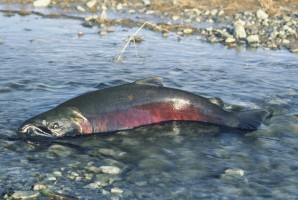
Coho salmon are threatened by suction dredge mining. (FWS)
In 2005, California’s Karuk Tribe brought a lawsuit against the California Department of Fish and Game (“CDFG”), alleging that CDFG permitted suction dredging despite knowing the significant harm caused to endangered fish species. In response to the lawsuit, a California court ordered an indefinite moratorium on suction dredging in California in 2009. Then-Governor Arnold Schwarzenegger signed Senate Bill 670 into effect, which codified the moratorium on suction dredging until the California Department of Fish and Game could complete an Environmental Impact Report detailing the impacts of suction dredging on wildlife and the environment. CDFG has failed to create this Environmental Impact Report. In July 2011, Assembly Bill 120 was signed, extending the moratorium until 2016. In 2012, California signed Senate Bill 1018 into law, which removed the end-date for the moratorium, signaling an indefinite ban on suction dredging in the state of California.
The state of California banned suction dredging because of the significant environmental harms it causes. The Karuk tribe pointed to the decline in salmon populations which had resulted from suction dredging when they brought suit against the CDFG in 2005 and again in 2009. Karuk tribe members fish using traditional methods; salmon fishing is a central part of their culture and was being threatened by suction dredging.
Suction dredging creates significant problems for water quality and wildlife. Like Oregon, California's rivers are home to several endangered salmon species, which were further threatened by suction dredging. In 2011, the CDFG acknowledged that mercury resuspension and discharge, as well as increased turbidity from suction dredging were “significant and unavoidable” consequences of suction dredging.
While Californians successfully advocated for a ban on suction dredging, suction dredge operators have now turned their sights on Oregon's rivers.


